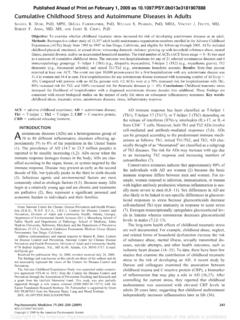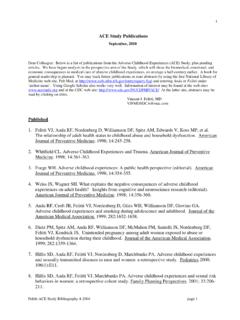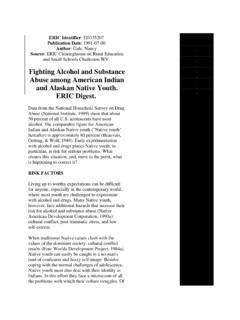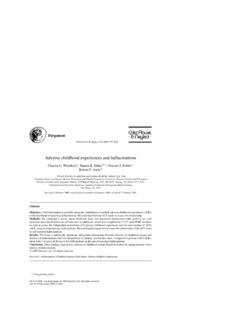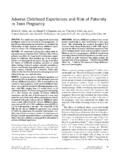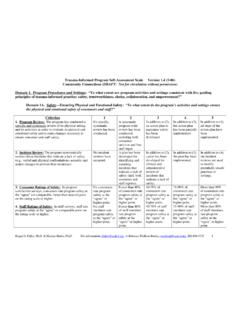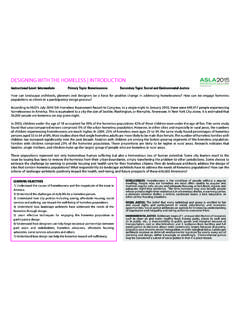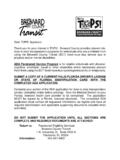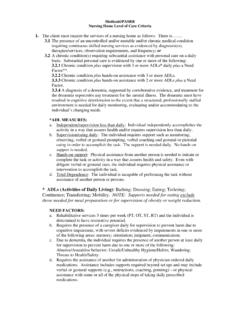Transcription of COMMUNITY RETRAUMATIZATION - the anna institute
1 COMMUNITY RETRAUMATIZATION Trauma Survivors Speak Out About How They Are Re-traumatized Within COMMUNITY mental Health and Substance Abuse Service Systems From In Their Own Words: Trauma survivors and professionals they trust tell what hurts, what helps, and what is needed for trauma services (1997) Jennings, A. and Ralph, R. Compiled by Ann Jennings, Maine Department of Behavioral and Developmental Services Office of Trauma Services "With abuse, you suffer loss of soul, loss of self and loss of meaning" "In the system, you must fight every day, every minute, to keep from feeling worthless - to keep your spirit alive" (Survivor) Available for download at COMMUNITY Re-Traumatizations I.
2 Environmental Insults and Insensitivities - Re-convey Messages of Worthlessness and Inferiority II. Denial, Discrediting, Ignoring, Minimizing or Silencing of Abuse Re-enacts Past Trauma III. Exerting Power and Control Over Client - Replicates Power Imbalance of Original Trauma IV. Not Accommodating the Vulnerabilities of the Trauma Survivor - is Revictimizing and Retraumatizing V. Housing Without Privacy, Control and Safety - Reenacts Abuse Environment and Is Retraumatizing VI. Repression of Emotions - Hinders Recovery and Replicates the Abuse Mandate of Silence VII. Being Pathologized and Blamed - Replicates the Abuse By Making It "Your Fault" VIII. Failure to Listen, Take Seriously, Learn From Survivors - Conveys Worthlessness, Replicates Abuse IX.
3 Using Diagnosis as Labeling, - Shames and Stigmatizes, Replicates Abuse X. Misdiagnosis Invalidating Experience Of Survivor - Leads To Maltreatment and Is Retraumatizing XI. Lack of mental Health Professionals Who Understand Your Experience and Can Help You - Leaves You Alone and Desperate As You Were As A Child XII. Being Treated As If You Aren't Intelligent, As If You Don't Have a Brain - Conveys Inferiority and Replicates Abuse XIII. Using Helpful Techniques and Theories In Hurtful Ways - Replicates Childhood Abuse XIV. Being Expected To Trust People Who Have Hurt Me or Who Have Allowed Others To Hurt Me - Replicates Relationship With Abuser And Those Who Should Have Protected Me XV.
4 Being Afraid Of Being Hurt In mental Health Services If I Tell The Truth - Reenacts Original Abuse XVI. Lack Of Privacy and Violation Of Confidentiality - Replicates Childhood Abuse XVII. Unrealistic Expectations : Being Set Up For Failure - Not Understanding Impacts of Trauma XVIII. Professionals Who Have Not Dealt With Their Own Childhood Abuse - May Be Hurtful XIX. Not Having Opportunities To Be Productive or To Help Others - Tears Down Self-Esteem and Exacerbates Sense of Being Worthless XX. Protocols That Make No Sense and Rules That Are Made And Changed Arbitrarily By Providers - Replicates Environment of Abuse XXI. 12-Step Programs Are Sometimes Shaming and Retraumatizing For Both Male and Female Abuse Survivors - May Replicate Abuse XXII.
5 Medical Procedures With No Understanding of Trauma - Can Be Retraumatizing XXIII. Poverty XXIV. Distancing and Objectifying - Replicates the Original Abuse and Prevents Healing Relationship In Their Own Words I. Environmental Insults and Insensitivities - Re-convey Messages of Worthlessness and Inferiority Different bathrooms for clients and staff Professional has cup of coffee, does not offer one to client Keeping people waiting, sometimes for hours, or all night at ERs Assuming individual is willing to ride all day to get to clinic Humiliating and lengthy process of trying to get social security entitlements and other financial assistance- forcing person to live with no income, no housing, and to have to go to a shelter II.
6 Denial, Discreditation, Ignoring, Minimizing or Silencing of Abuse - Re-enacts Past Trauma "Professionals don't want to hear about or deal with sexual abuse" Casting doubt on the validity and seeking to discredit what the survivor says about her/his memories and experience of abuse is extremely traumatizing - and is exact replication of a most painful part of original childhood abuse experience. Failure to initiate discussion of sexual abuse sends message that such abuse does not occur or does not matter, confirms persons belief in the need to deny the reality of the experience, and maintains guilt and isolation of person. Conceptualizing recollections of abuse as psychosis, characterological manipulations, or oedipal fantasies colludes with the family's denial of the occurrence and impact of abuse, or with the victims sense of guilt and defectiveness.
7 Results in misdiagnosis, misinterpretation and maltreatment fragmented memories and logical anger and fear get viewed as insanity accommodations developed to deal with the abuse and with the systems failure to address it, are labeled dissociative, psychotic, affectively disordered, inappropriately distrustful, etc. and are seen as pathology III. Exerting Power and Control Over Client - Replicates Power Imbalance of Original Trauma Exerting your will onto client in any way - "for their own good" - unless he or she has given you explicit permission in advance to do so. (ie. advance directive in case of emergency) Any behavior which does not demonstrate respect for the client's wishes and which deprives her or him control over the interactions: : o not asking permission before making a home visit.
8 O arranging to ride in a car, or attend a recreational activity uninvited o forming treatment plans which impose perceptions and desires of others on client Foisting services on unwilling clients - risk creating atmosphere like that in which a controlling adult asks a vulnerable child to do something that the child knows she does not want to do, in effect replicating the very dynamics of the trauma itself. Insistence on being "in charge". Because abusers use power to threaten and intimidate victims, clients are wary of worker who has lots invested in being in charge. For some, any relationship in which a power imbalance exists may be reminiscent of the abuse relationship.
9 Not recognizing the power imbalance inherent in staff/client relationship, especially between psychiatrist and client. A contract should be a two-way agreement. the way it is done, you do all the contracting - and they make no contract with you regarding what they will and will not do. Language of oppression: replicates abuse o My - that was an angry feeling o Remember, you've already lived through the worst o Nobody can hurt you now o Use of rhetoric, jargon, the therapeutic "milieu" your behavior is inappropriate your affect is not appropriate your affect is blunted o The therapeutic "we": How are "we" feeling today? We're going to have a nice bath now We're going to eat something now We won't have any negativity My, we're in a hostile mode today Shall we join the group?
10 Withholding services IV. Not Accommodating the Vulnerabilities of the Trauma Survivor - is Revictimizing and Retraumatizing Placing perpetrators and victims in same groups, day programs, group homes, etc. Person stuck in same day program group as person she had protection order against. She protested and was rejected from group. This is often as important for the perpetrators (who are frequently survivors of childhood sexual abuse themselves) as it is for the victims Insensitivity to gender issues: o eg. Assigning male case manager to victim of male perpetrator (unless given permission) o eg. Assigning woman therapist when perpetrator was female or where woman is perceived as failed protector and target for rage.


